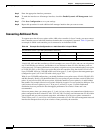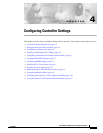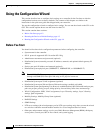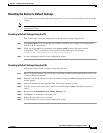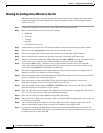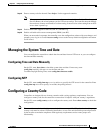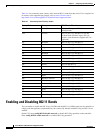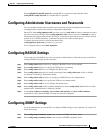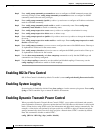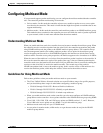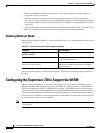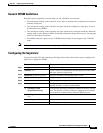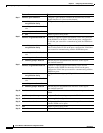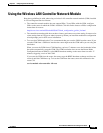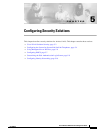
4-8
Cisco Wireless LAN Controller Configuration Guide
OL-8335-02
Chapter 4 Configuring Controller Settings
Enabling 802.3x Flow Control
Step 3 Enter config snmp community accessmode ro name to configure an SNMP community name with
read-only privileges. Enter config snmp community accessmode rw name to configure an SNMP
community name with read-write privileges.
Step 4 Enter config snmp community ipaddr ip-address ip-mask name to configure an IP address and subnet
mask for an SNMP community.
Step 5 Enter config snmp community mode enable to enable a community name. Enter config snmp
community mode disable to disable a community name.
Step 6 Enter config snmp trapreceiver create name ip-address to configure a destination for a trap.
Step 7 Enter config snmp trapreceiver delete name to delete a trap.
Step 8 Enter config snmp trapreceiver ipaddr old-ip-address name new-ip-address to change the destination
for a trap.
Step 9 Enter config snmp trapreceiver mode enable to enable traps. Enter config snmp trapreceiver mode
disable to disable traps.
Step 10 Enter config snmp syscontact syscontact-name to configure the name of the SNMP contact. Enter up to
31 alphanumeric characters for the contact name.
Step 11 Enter config snmp syslocation syslocation-name to configure the SNMP system location. Enter up to
31 alphanumeric characters for the location.
Step 12 Use the show snmpcommunity and show snmptrap commands to verify that the SNMP traps and
communities are correctly configured.
Step 13 Use the show trapflags command to see the enabled and disabled trapflags. If necessary, use the
config trapflags commands to enable or disable trapflags.
Enabling 802.3x Flow Control
802.3x Flow Control is disabled by default. To enable it, enter config switchconfig flowcontrol enable.
Enabling System Logging
System logging is disabled by default. Enter show syslog to view the current syslog status. Enter config
syslog to send a controller log to a remote IP Address or hostname.
Enabling Dynamic Transmit Power Control
When you enable Dynamic Transmit Power Control (DTPC), access points add channel and transmit
power information to beacons. (On access points that run Cisco IOS software, this feature is called world
mode.) Client devices using DTPC receive the information and adjust their settings automatically. For
example, a client device used primarily in Japan could rely on DTPC to adjust its channel and power
settings automatically when it travels to Italy and joins a network there. DTPC is enabled by default.
Enter this command to disable or enable DTPC:
config {802.11a | 802.11bg} dtpc {enable | disable}



